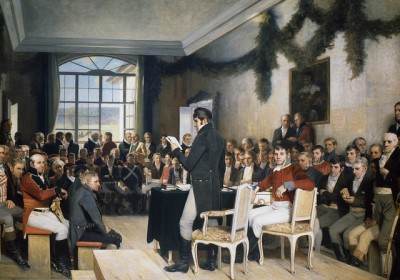The Norwegian Parliament introduced a raft of amendments to the Constitution (Grunnloven) this week in the historic document’s most comprehensive revision since it was first adopted 200 years ago. A number of proposals strengthening human rights were adopted in the run-up to the document’s bicentennial celebrations on Saturday, the country’s Constitution Day holiday on the 17th of May, but some politicians said a “golden opportunity” for further reform had been missed.

Some political and civil rights were unanimously adopted for formal inclusion in the constitution, including equality before the law, the right to a fair trial, and prohibitions against the death penalty, torture and inhumane treatment. Other key rights included freedom of association and assembly, children’s right to respect and being heard, and that everyone has the right to education, along with a prohibition against arbitrary detention.
The overhaul was the culmination of a process which began in 2009 when Parliament appointed a committee to investigate and propose stronger human rights measures in the Constitution, reported news bureau NTB. To make any constitutional amendments, two-thirds of the members of Parliament must be present for a vote, and a two-thirds majority must be secured. Furthermore, the proposals cannot be adopted in the same parliamentary term as they are made. They must be made in the first three years of one parliamentary term, then addressed within the first three years of the following term.
The opposition parties failed to secure a majority for other proposals they wanted included in the Constitution, such as the right to health care, asylum and the recognition of the Sami as an indigenous people, after the government Conservative (Høyre) and Progress Parties (Fremskrittspartiet, FrP) voted them down. Proposals from the Christian Democrats (Kristelig Folkeparti, FrP) to protect the right to life from the point of conception, and to have the family written into the Constitution as the fundamental unit, also failed to gain a majority.
Mixed reactions
The coalition parties were happy with the measures adopted, but those in opposition said the reforms should have gone further. “Overall this is a happy day, we have made a number of important decisions, but we didn’t go the last necessary meters,” said Abid Raja, the Liberal (Venstre) representative on the Standing Committee on Scrutiny and Constitutional Affairs (kontroll- og konstitusjonskomiteen). “We had a golden opportunity to stake out the future course for Norway now, but unfortunately did not. Now it can take 50 years or more before these decisions come up for review.”
“It is a day of mixed emotions,” said Jette Christensen, the Labour (Arbeiderpartiet, Ap) representative on the committee. “We were invited by the Human Rights Committee (Menneskerettighetsutvalget) to take a great responsibility in making the Constitution what it is meant to be, a fully-fledged political and legal document. But because of Høyre and the FrP‘s attitudes, we only got the opportunity to take half of this responsibility.”
“I am very satisfied,” said Conservative committee representative Michael Tetzschner. “We put in place important civil and political rights, while also preventing too much dilution.” He argued that many of the opposition’s proposals were too rubbery, and would pass too much interpretive power from elected members of parliament to the judiciary. “The provisions are so open and vague that they could have led to judgments about performance in practice, without any budget constraints.”
The Christian Democrats were disappointed their “good human rights proposals” were not included, but Labour welcomed their exclusion. “The debate today and the vote have once again parked KrF’s attempts to move the abortion issue into the Constitution,” said Christensen.
Tuesday’s reforms followed a decision by Parliament last week to modernize the language of the original constitutional document, written in bokmål, and include a second version in Norway’s other official language, nynorsk.
newsinenglish.no/Emily Woodgate

